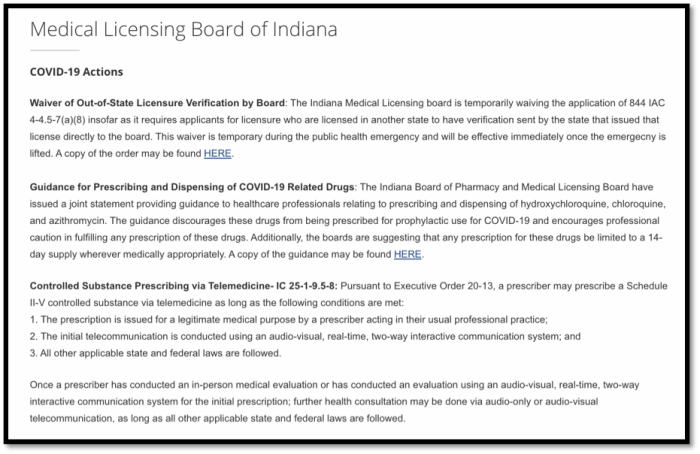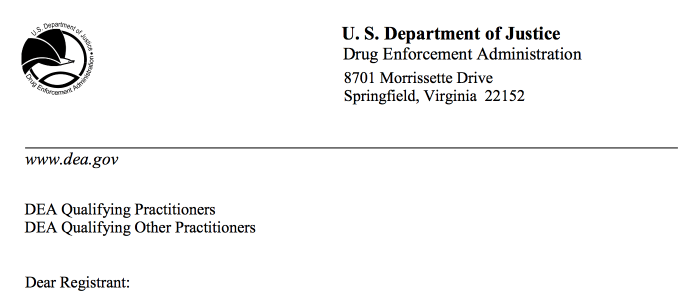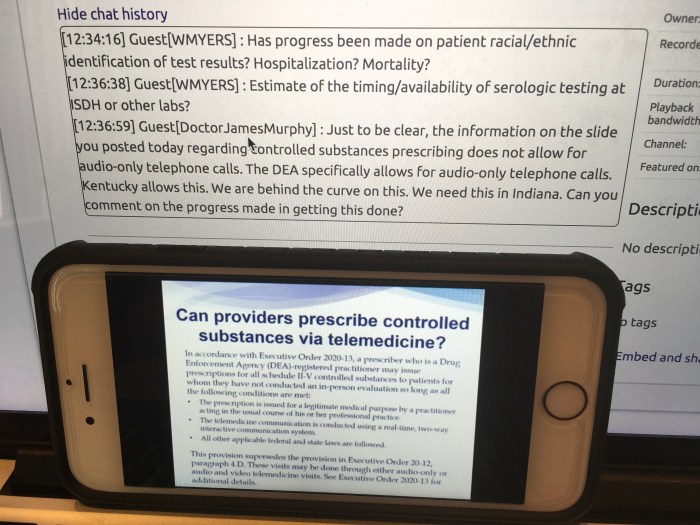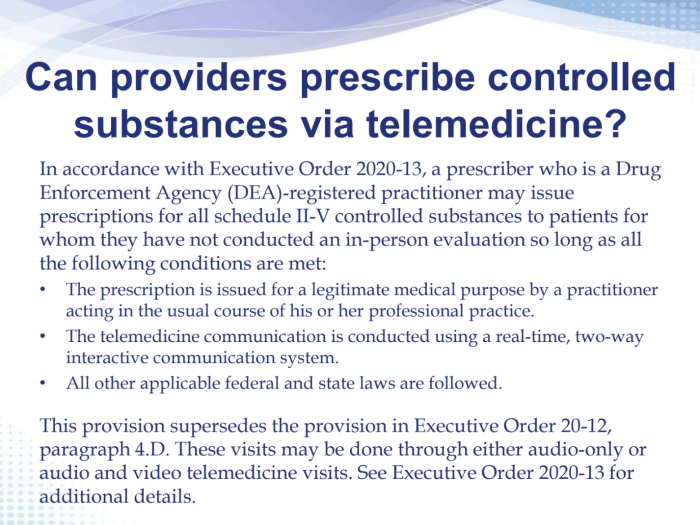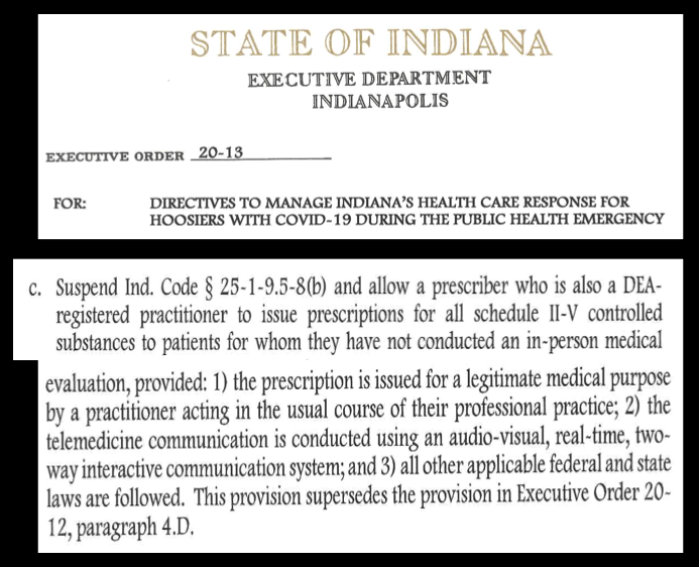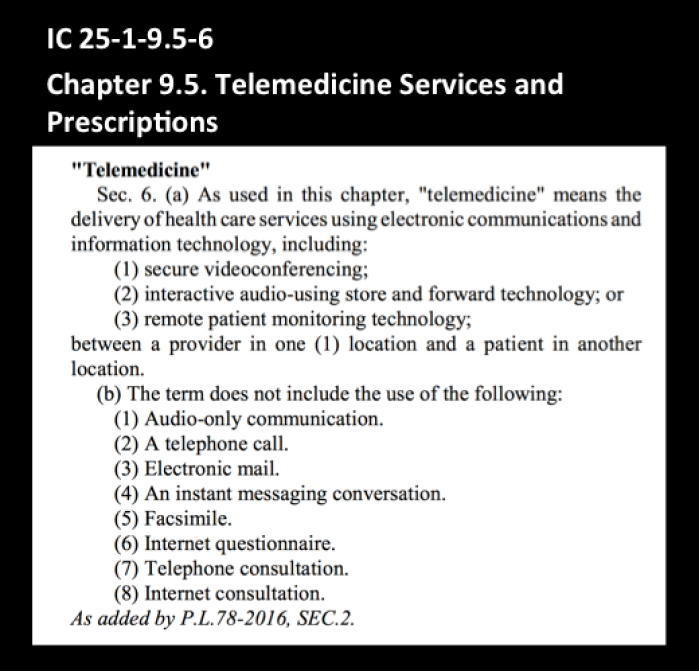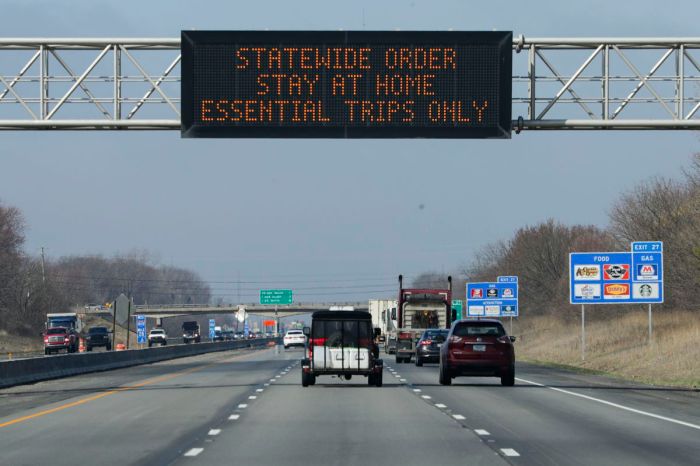
*FIRST PUBLISHED ON APRIL 2,2020 AND UPDATED ON APRIL 9, 2020 & MAY 28, 2020
MAY 28, 2020: ON OR ABOUT APRIL 23, 2020 THE MEDICAL LICENSING BOARD OF INDIANA UPDATED THEIR WEBSITE TO SAY:
Once a prescriber has conducted an in-person medical evaluation or has conducted an evaluation using an audio-visual, real-time, two-way interactive communication system for the initial prescription; further health consultation may be done via audio-only or audio-visual telecommunication, as long as all other applicable state and federal laws are followed. (LINK: https://www.in.gov/pla/medical.htm)
I AM CERTAIN I SPEAK FOR MOST OF THE PROVIDERS, CITIZENS, AND PATIENTS OF INDIANA WHEN I SAY “THANK YOU” FOR THIS NECESSARY ACTION.
•
Dear Governor Holcomb,
I am a New Albany, Indiana physician with an urgent plea. During the COVID-19 emergency, Indiana must allow prescribers to treat pain patients on opioids via audio-only telemedicine. Currently the requirement is for audio-visual telemedicine.
On March 6, 2020, Indiana declared a state of emergency due to COVID-19. As a result, extraordinary measures have been taken to allow patients to shelter in their homes. However, many chronic pain patients, among the most vulnerable to the SARS-CoV-2 Coronavirus, are still required to have in-person face-to-face visits with prescribers in order to receive a prescription for a controlled substance. This is because, although Indiana now allows audio-visual telemedicine for follow-ups, the state does not allow audio-only telephone calls to serve as telemedicine for controlled substance follow-up visits.
This has to change immediately.
We know that many people, especially the elderly, do not have access to audio-visual telecommunication. However, everyone has a telephone. Therefore, Indiana practitioners must be allowed to conduct audio-only telephone follow ups when prescribing controlled substances for their patients, especially patients who have previously had an in person examination. As it stands now, to prescribe an opioid via telemedicine, the Indiana Professional Licensing Agency still includes a requirement that: “The telecommunication is conducted using an audio-visual, real-time, two-way interactive communication system.”
Indiana has fallen dangerously behind the curve on this issue.
For example, look to the DEA’s COVID-19 Prescribing Guidance, which has been updated “to allow DEA-registered practitioners to prescribe controlled substances without having to interact in-person with their patients.” Specifically, the DEA now allows prescribers who have “previously examined the patient in person” to “conduct any needed follow-up evaluation by any method: in person, telemedicine, telephone, email, etc.”
And the American Medical Association’s “COVID-19 policy recommendations for OUD, pain, harm reduction” could not be more clear: “For patients with chronic pain, waive testing requirements and in-person counseling requirements for refills; allow for telephonic counseling to fulfill state prescribing and treatment requirements.”
In these extraordinary times, we must do everything in our power to ensure that all patients can access care remotely when at all possible. And for our patients with chronic pain on opioid therapy, the extreme stress from withdrawal or fear of withdrawal must be prevented or else we shall see increased and unnecessary morbidity and mortality amongst our citizenry. When patients are forced to leave their safe homes for face-to-face visits with providers, they imperil their lives, the lives of healthcare workers, and the lives of their community.
Audio-visual telemedicine, despite the perceived advantages as compared to a simple telephone call, is not feasible for many vulnerable Hoosiers. Indiana must join with the DEA, the AMA, and numerous other private and government organizations and immediately allow providers to remotely treat patients, for whom controlled substances are necessary, via any appropriate method, including audio-only telecommunication.
Thank you for your service to Indiana and thank you for taking the time to read this e-message. As soon as I hit “send” I will be on the telephone with my patient, Judy, who is 73, crippled with unimaginable arthritis, sheltering in her home, and anxiously waiting for her doctor to call. I have provided you my personal cell phone number in case you or someone on your staff would like to call me. I must apologize in advance, however, if the line is busy. As you well know, these are extraordinary times.
Respectfully,
James Patrick Murphy, MD
Medical Director, Murphy Pain Center, New Albany, IN
Assistant Clinical Professor, University of Louisville School of Medicine
Past-president, Greater Louisville Medical Society
Member, American Medical Association Pain Care Task Force
April 2, 2020
•
Addendum:
Governor Eric J. Holcomb’s phone number is: 317-232-4567
And the Governor can be emailed via this link: https://www.in.gov/gov/2752.htm
•
(DEA-DC-023)(DEA075)Decision_Tree_(Final)_33120_2007
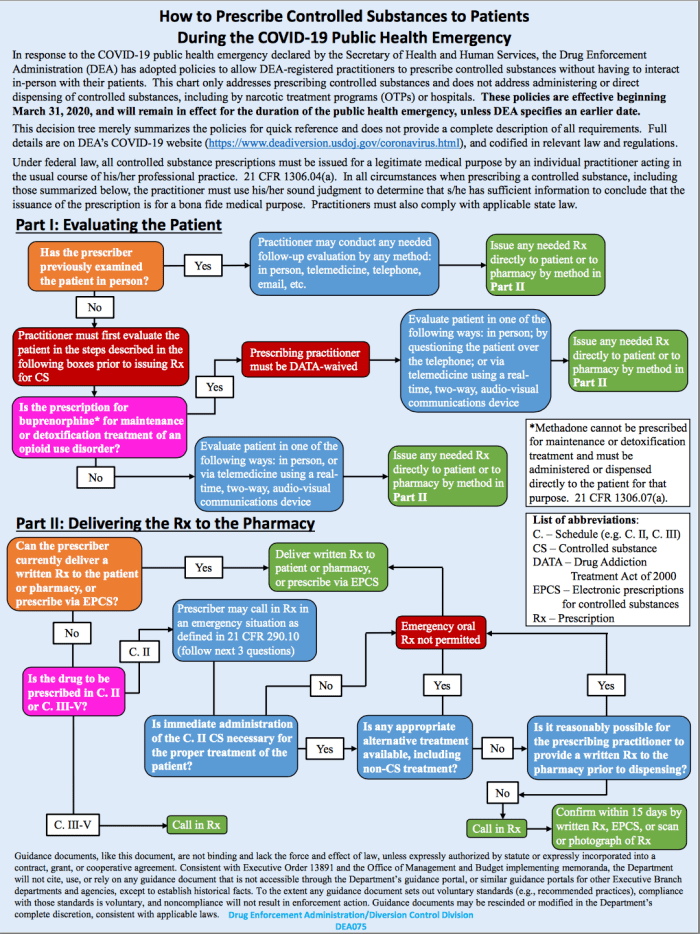
•
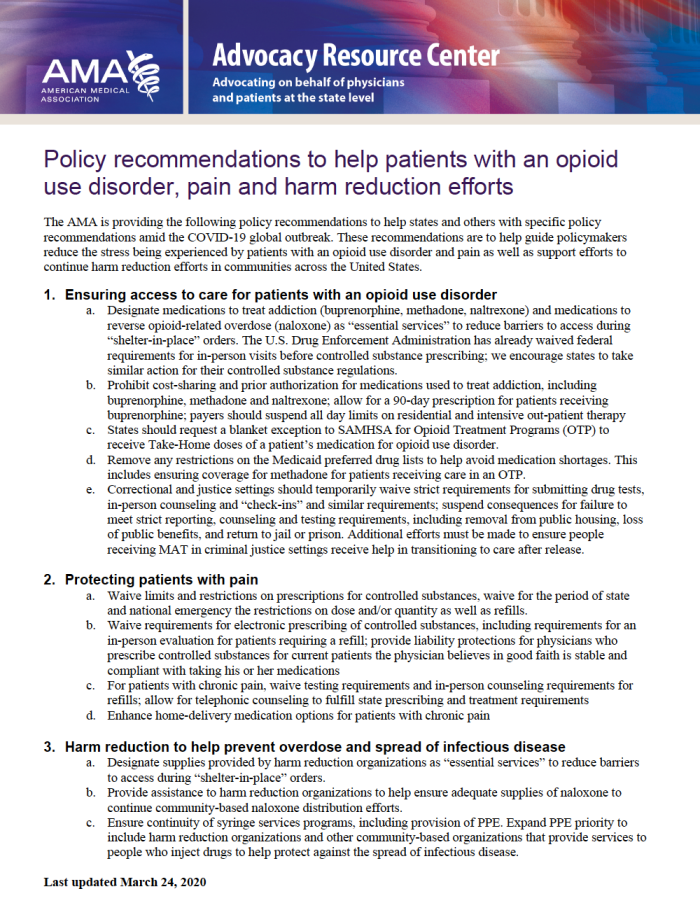
•
Where a prescription for a controlled substance is issued by means of the Internet, the CSA (as amended by the Ryan Haight Act) requires that such prescription involve at least one in-person medical evaluation, with limited exceptions. After conducting one in-person medical evaluation, a practitioner may thereafter prescribe controlled substances by means of the Internet or via telephone.
- DEA068 – March 31, 2020
https://www.samhsa.gov/sites/default/files/dea-samhsa-buprenorphine-telemedicine.pdf
•
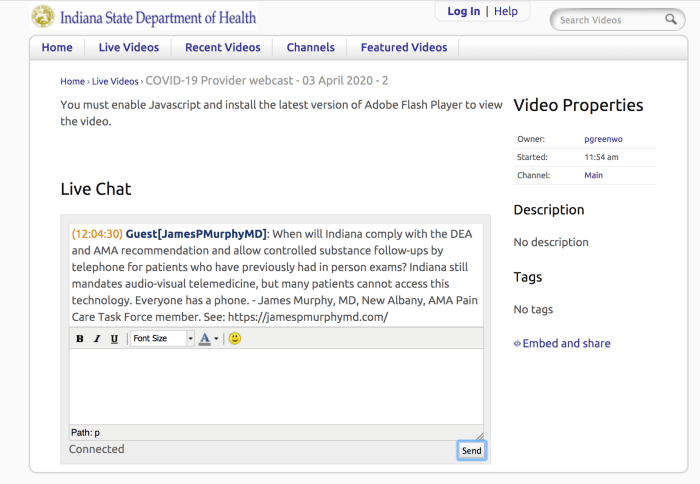
A verbal response to my question (see above) was transmitted during the Q&A portion of the Indiana State Department of Health Provider Webcast on April 3, 2020 and was encouraging:
Yes, we are doing this. We are putting together all the waivers that are done into a package and as soon as all the right people approve that will be done. So we heard you. I brought your question last week to the powers that be and they agree. So we’re working on that.
- Lindsay Weaver, MD, FACEP, Chief Medical Officer, Indiana State Department of Health
Thank you, Dr. Weaver.
• • • • •
APRIL 9, 2020 UPDATE:
Today another Indiana State Department of Health Provider Webcast took place. At the conclusion, I asked this question of Dr. Weaver:
DoctorJamesMurphy: Just to be clear, the information on the slide you posted today regarding controlled substances prescribing does not allow for audio-only telephone calls. The DEA specifically allows for audio-only telephone calls. Kentucky allows this. We are behind the curve on this. We need this in Indiana. Can you comment on the progress made in getting this done?
And here was the answer that Dr. Weaver recited on air:
So this again is a question about audio-only telephone calls. So I spoke specifically with our group about this and they did feel like it allowed for audio-only telephone calls. So I don’t know where the miscommunication is. I think there probably is another point to that waiver or that order that wasn’t included in that slide. If you just want to go ahead and send you name, then we can follow up with you or your email address. [Addendum: I immediately sent my email address]
Here is what I believe to be the miscommunication:
Dr. Weaver’s slide says this:
This slide indicates that Executive Order 2020-13 allows for “using a real-time, two-way interactive communication system.” This would appear to include audio-only telephone calls. But wait…
Dr. Weaver’s slide is not consistent with what Executive Order 2020-13 actually says, see below:
And there is more to the story… Executive Order 20-13 also says this:
In other words, Executive Order 20-13 seems to lift the prohibition against audio-only telemedicine by amending Indiana’s definition of telemedicine to include audio-only phone calls. Here is actual language from Indiana Code 25-1-9.5-6 that Executive Order 20-13 amends:
Therefore, it would seem that telemedicine in Indiana might now include “audio-only communication.”
So, as of 4:30 pm on April 9, 2020 here is where I believe this stands:
The slide presented today from Dr. Weaver, acting as an agent of the Indiana Department of Health, would appear to give a green light to audio-only telephone calls for issuing a controlled substance. But Dr. Weaver’s slide references Executive Order 20-13 that clearly does not say that audio-only telephone calls are sufficient. Where did Dr. Weaver get the verbiage for her slide?
And the COVID-19 updates to the the Indiana PLA website only references the previous Executive Order 20-12, which, like Executive Order 20-13, does not give the “OK” for audio-only telephone calls.
On top of that, the Indiana prescribing regulations, which no one is mentioning, still mandate a face-to-face visit (i.e. no mention of a telemedicine option) at least every four months.
From my non-lawyer, not offering legal advice, physician taking care of patients day in and day out point of view, it seems that somewhere in this cacophony of regulations, orders and pronouncements there is probably enough leeway to allow Indiana prescribers to go ahead and act in the best interest of their patients.
Dr. Lindsay Weaver is a board-certified Emergency Medicine physician engaged in battling the defining medical crisis of our time. She is doing an admirable job. And, with regards what the regs and the laws say we can and cannot do when prescribing controlled substances, she and I can totally agree on this…
What we’ve got here is failure to communicate.
